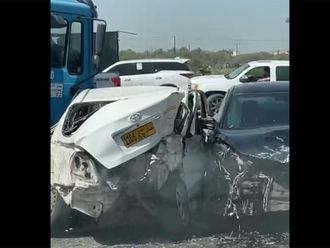Muscat: The number of fatalities from accidents in Oman could be much higher because the Royal Oman Police (ROP) tally only counts deaths at the scene, according to an international expert.
“The actual death toll could be higher by a factor of five as the official tally only accounts for deaths at the scene,” Anthony Pearce, honorary life member and former director-general of the International Road Federation (IRF), said in his presentation at the Oman Transport Infrastructure Summit that concluded recently at the Grand Hyatt Muscat.
“Casualties succumbing in hospitals are typically not included in the official toll,” he said in his presentation at the Global Exhibitions and Conferences (GEC) organised event.
The IRF expert also pointed out that most of the fatalities involve youngsters in their 20s. “Majority of the accidents take place during weekends and outside the capital region. Further, 60-70 per cent of the emergency surgeries undertaken in hospitals pertain to road accidents,” he said.
The international expert on traffic also said that the road accidents cost the Omani economy a staggering $1.8 billion a year, equivalent to 2.1 per cent of the national Gross Domestic Product (GDP).
Pearce singled out speeding as a significant factor in road deaths, accounting for around 30 per cent of fatalities worldwide.
“Reducing average speeds by a mere 3 km/hour could save as many as 3,500-4,000 lives per year in the Gulf region,” he believes.
“Full enforcement of speed limits could save a third of all lives claimed by road accidents in the Gulf,” he suggested.
Pearce urged car buyers to choose the safest models they can afford. He proposed the establishment of a lead agency at the highest levels of government to oversee road safety issues.
“Other imperatives, he said, “include improved traffic law, and a licensing system with penalties for infringements.”












